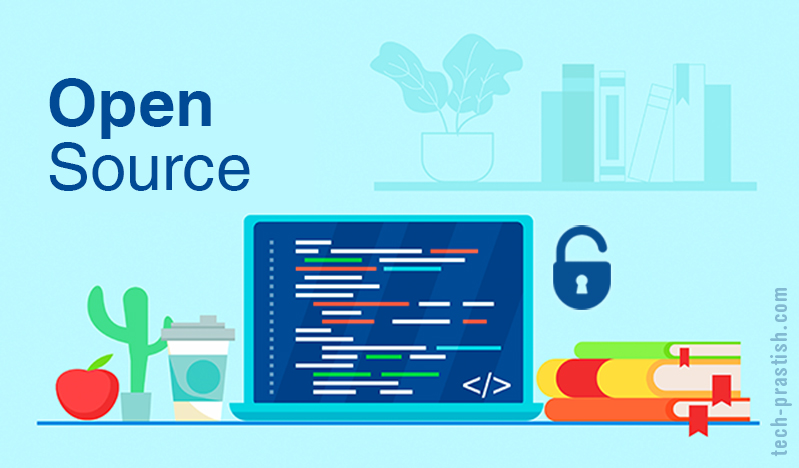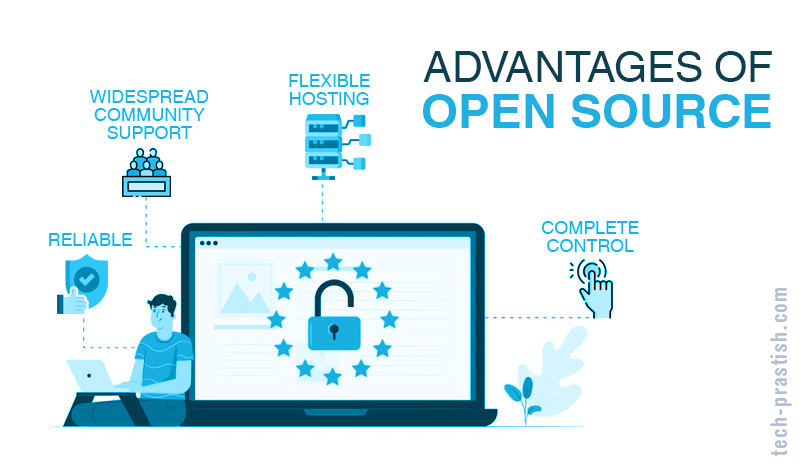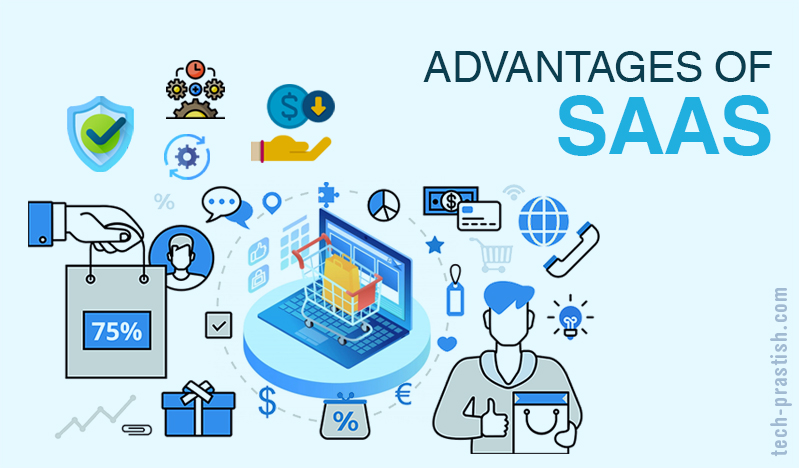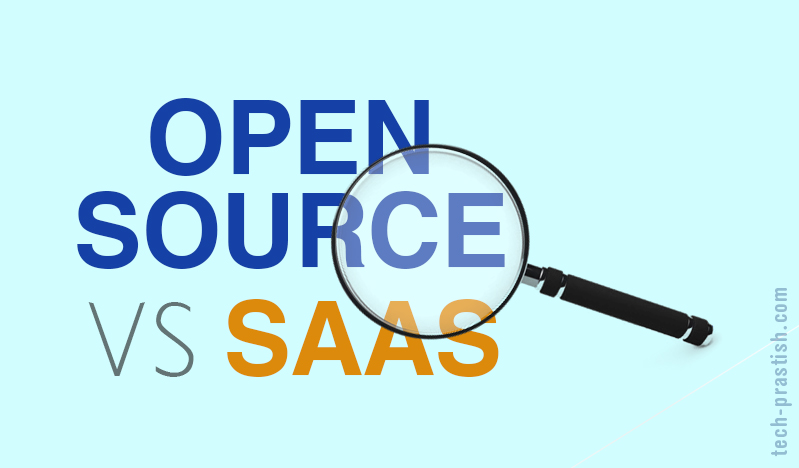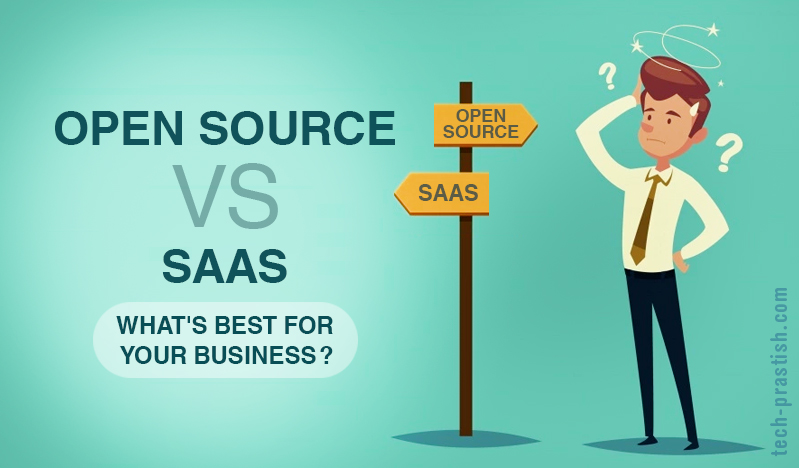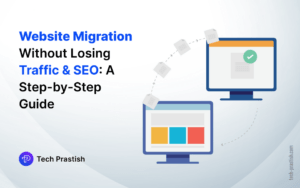
Over the past year, the COVID-19 pandemic has changed the way we plan, think, and of course, shop for items that we need. According to a report by Statista, the eCommerce share of retail sales in the United States is expected to reach 19.2 percent by 2024.
Thus, building a strong online presence is important for the survival and growth of your business in this highly competitive market. Your online store is at the center of all internet marketing activity that you do for your business. Hence the efficiency, reliability and user-friendliness of online store/web store is critical to the success of your business on the internet.
When it comes to building online stores, one of the first questions that business owners have is – which genre of eCommerce platforms to choose – Open Source or SaaS?
To make the right decision, you need to acquire an understanding of both the platforms, their advantages & disadvantages, and major differences between them.
What is an Open Source eCommerce Platform?
Open source means you have full access to the original source code. In other words, you can make the required changes to build a custom online store for your business. Since open source software can be complex, it’s recommended to hire certified developers for customizing them.
You can alter the source code to add new functionalities & change the existing ones. Thus, it’s possible to create a unique online store that aligns with your business goals.
Examples of open source platforms are WooCommerce, nopCommerce, OpenCart, PrestaShop, Magento, and Zen Cart.
What is a SaaS (Software-as-a-Service) eCommerce Platform?
As the name suggests, a SaaS eCommerce platform is an online store builder that is hosted by a third-party provider in the cloud. Thus, without worrying about issues associated with website maintenance, you can create an eCommerce store for your business.
Basically, SaaS software is licensed on a subscription basis with different pricing plans. You can choose a plan (based on the features you want) and set up your online store quickly.
Unlike open source platforms, you can’t install SaaS software on your personal computer. Plus points of using SaaS platforms are ease of use and excellent customer support.
Examples of SaaS eCommerce platforms are Shopify, BigCommerce, and Volusion.
Also Read– Magento to Shopify Migration – Why to Migrate?
Advantages of Open Source eCommerce Platform
Total Control
In my opinion, this is the best thing about open source eCommerce platforms. You will get the original source code, and you can modify it based on your requirements. Select from a wide range of themes, features, and plugins, and
create an eCommerce store matching your unique business needs. If you don’t have coding skills, you can hire an expert to make the changes for you.
Flexible Hosting
Server downtime can ruin everything your developers had burnt their midnight oil for. So, make sure your business’s website is in safe hands. A great web hosting service, which is reliable, secure & fast can ensure that the quality of service to your customers is the best in the market. You can choose your own hosting solution for an eCommerce website, built on an open source platform. I advise you to research well before you make a decision about your hosting service provider.
Reliable
Another plus point is that open source website builders are reliable. They are created by professional developers who work dedicatedly to build the best programs. So, you can get any issues in your online store fixed without waiting for third-party professionals to do so for you.
Widespread Community Support
By choosing open source eCommerce platforms, you can be a part of a big community of developers who are passionate contributors. The open source community offers support to users to deal with bugs. Thus, by reading blogs and participating in forum discussions, you can gain knowledge of experts and share your knowledge with them as well.
Disadvantages of Open Source eCommerce Platform
More Complexity
With open source eCommerce platforms, you won’t get hosting, plugins, and marketing & analytics tools. Moreover, you need to have coding knowledge to develop and maintain your custom online store.
Unpredictable Costs
Most of the open source eCommerce platforms allow free access to their source codes. That’s why many business people prefer them. However, there are several hidden/unpredictable costs associated with building an online store using open source software. These include maintenance costs, salaries of developers and tech professionals, hosting charges, etc.
Vulnerable to Malicious Users
Anyone can download and alter the source code. This can be both a plus and a minus. While many people use the code to solve potential issues, others use it for creating bugs, which may result in data theft, hardware damage, etc.
Advantages of SaaS eCommerce Platform
Quick Set up
Setting up your eCommerce store with a SaaS platform is very easy. Choose from a wide range of themes and layouts, add your products and launch your store.
For instance, you can launch your Shopify store in a few minutes. Sign up for your Shopify account, customize your store, set up the domain, activate the payment process, and start selling.
If you need professional help to improve the look of your Shopify store, hire Shopify expert designers.
Security & PCI Compliance
Being a PCI compliant merchant ensures protection of your customers’ payment information according to the data security standards. This way, you can prevent fraudulent online transactions.
SaaS software ensures PCI compliance to provide your customers with the utmost security of their data. Moreover, providers keep their SaaS-based eCommerce platforms up to date by fixing any bugs associated with data security.
Affordable
As compared to open source eCommerce software, developing an online store using SaaS-based platforms is affordable. This is because you are not building it from scratch and you don’t have to spend too much on add-ons.
Additionally, you don’t have to take care of website maintenance and pay for bug fixes to the software.
Easy Integration
Another advantage of SaaS-based eCommerce platforms is that you can connect them with other cloud-based applications via APIs. In other words, you can easily share data with other applications. This will help improve both employee and customer experience.
Customer Support
SaaS eCommerce platforms deliver direct, dedicated support to help users get quick solutions for their problems. Usually, SaaS customer support is included in the package. For instance, BigCommerce provides 24/7 support for merchants and their customers.
Also Read- Why You Should Use BigCommerce For Building Your Online Store?
However, like open source platforms, various SaaS-based software also have a strong community. Thus, you can easily connect to thousands of merchants and participate in discussions related to design, apps, eCommerce marketing, etc.
Disadvantages of SaaS eCommerce Platform
Lack of Customization
SaaS eCommerce platforms allow you to use limited prebuilt templates to build your online store. Since you don’t have access to the original source code, SaaS software lacks the ability for extreme customization. In other words, you might not be able to create a unique, custom store you want.
Content Management
SaaS platforms are created for shopping, and they don’t have content management features, which are important for B2B businesses. For instance, your customers can’t see product suggestions based on their previous purchases.
Low Performance
SaaS software providers offer merchants with various add-ons to improve sales and social media strategies. But, if you use too many add-ons, it can hurt your website’s performance.
Missing B2B Features
Running an eCommerce store isn’t only about processing online orders. You need to address your customers’ experience and show them products based on their needs. Most of the SaaS eCommerce platforms don’t have B2B tools, such as-
➢ Allowing sales representatives to sign in and place orders on their customers’ behalf
➢ Allowing customers to review orders placed offline
Comparison of Open Source with SaaS Platforms!
The major benefit of using an open source eCommerce software is that it allows you to build a custom online store. But, using SaaS platforms, you can set up your eCommerce store easily as it gives an out of the box experience and saves maintenance costs.
Here are the major differences between open source and SaaS platforms with
respect to certain important aspects listed below –
1. Build Time
2. Customization
3. Maintenance
4. Scalability
5. Cost
6. Security
7. Customer Support
And now we would compare both with respect to each criteria in detail –
Build Time
Open source eCommerce platforms are quite difficult to install. Without coding knowledge, you can’t set up your online store on your own. The process is quite complex, and you need to hire developers for help.
On the other hand, setting up your online store using SaaS platforms is easy. Select a theme, add products to your store, set up your payment process, and done. So, SaaS is the winner here.
Customization
If you are using open source software, you have the freedom to create your store with custom layouts, features, etc. But, things are limited in the case of SaaS-based platforms. You have to use the resources provided by the provider to build your store.
Maintenance
Having a website built using an open source software means you are responsible for its maintenance. You need to take care of software updates for fixing bugs and adding new features. No doubt, the process takes a lot of time and effort.
But, when you are using a SaaS-based eCommerce platform, you don’t have to worry about hosting, bug fixing, etc. Just focus on getting customers and processing orders and leave the rest on the SaaS provider.
Scalability
In the eCommerce world, you must be prepared to scale. When your business grows, you need to optimize your marketing strategies to keep up with the momentum. Using SaaS-based platforms, you can easily add new sales channels to get new customers.
In the case of open source platforms, the process of scaling your operations up can be difficult. In fact, adding new features and upgrading the existing infrastructure can cost you more.
Cost
SaaS eCommerce builders can be cost-effective options for small businesses with 1-2 users. However, it could turn into a significant expense for large organizations with 20-30 users. So, in the latter case, building your online store using open source software can be the right option.
No doubt, you can’t ignore costs of hardware, operating systems, and salaries of professionals when evaluating the expenses related using open source platforms. So, make sure you do the maths before making the decision.
Security
Anyone can download and alter the source code of an open source platform. Thus, a minor vulnerability could result in a security breach. Thus, your team must be proactive to find out the security issues and develop relevant solutions for them.
Most SaaS-based platforms provide PCI compliance, which ensures the protection of your customers’ payment information.
Customer Support
SaaS platforms offer 24/7 support to help users fix their issues. Thus, for beginners who don’t have in-house technical resources, they would be the right options. Additionally, there are big communities of different platforms like open source platforms.
Which One is Right For You?
Well, it depends on your business needs and available resources. If you want to build a custom eCommerce store, choose an open source eCommerce platform.
Remember, developing your open source eCommerce store is like building a house. You have to buy a lot, hire professionals, purchase building materials, etc. You will get what you want, but it can cost you a lot of money.
If you don’t have enough time and resources to handle website maintenance, software updates, etc., go for SaaS eCommerce builders. SaaS platforms can also help you save money and effort, thus allowing you to focus on other important things.
So, that’s all about open source vs SaaS eCommerce platforms. Hope you get the answer for – which is right for building your online store? If you have any questions related to developing and growing an eCommerce store, talk to our expert developers today.
There are many Ecommerce development agencies like us that have consultants who can spend time with you in understanding your business goals and preferences. They will help you choose the right eCommerce platform.
After all, choosing the right eCommerce platform makes all the difference.
